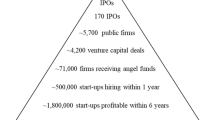Abstract
Recent work by Sarasvathy and Venkataraman (Entrepreneurship Theory and Practice, 113–135, 2011) suggest that entrepreneurship may offer an alternative to the scientific method in solving some of the increasingly complex problems facing modern society. This paper adopts an entrepreneurial method framework to explore how social enterprises (SEs) can more efficiently and effectively provide goods and services to the needy. SEs have the potential to improve efficiency and effectiveness by innovating new products, processes, strategies, and/or business models to better meet their beneficiaries’ needs. Three case studies of SEs are used to explore the process and the outcomes of the entrepreneurial method. In addition, propositions are developed to illustrate the social and economic performance advantages of SEs and offer managerial implications for enhanced practice.
Similar content being viewed by others
References
Alvord, S. H., Brown, L. D., & Letts, C. W. (2004). Social entrepreneurship and societal transformation: an exploratory study. The Journal of Applied Behavioral Science, 40, 260–282.
Antoncic, B., & Hisrich, R. D. (2004). Corporate entrepreneurship contingencies and organizational wealth creation. The Journal of Management Development, 23(6), 518–550.
Chandler, G. N., DeTienne, D. R., McKelvie, A., & Mumford, T. V. (2011). Causation and effectuation processes: a validation study. Journal of Business Venturing, 26, 375–390.
Corner, P. D., & Ho, M. (2010). How opportunities develop in social entrepreneurship. Entrepreneurship Theory and Practice, 34(4), 635–659.
De Bruin, A. M. & Ferrante, F. M. (2011). Bounded opportunity: a knowledge-based approach to opportunity recognition and development. Advancing Research on Innovation and Entrepreneurship, 1(4), Article 2, 21 pages.
Denrell, J., Fang, C., & Winter, S. G. (2003). The economics of strategic opportunity. Strategic Management Journal, 24, 977–990.
Emerson, J., & Twersky, F. (1996). New social entrepreneurs: The success, challenge and lessons from non-profit enterprise creation. San Francisco: Roberts Foundation, Homeless Economic Development Fund.
Hisrich, R. D. (1990). Entrepreneurship/intrapreneurship. American Psychologist, 45(2), 209–222.
Ireland, R. D., & Webb, J. W. (2009). Crossing the great divide of strategic entrepreneurship: transitioning between exploration and exploitation. Business Horizons, 52, 469–479.
Johannessen, J.-A., Olsen, B., & Lumpkin, G. T. (2001). Innovation as newness: what is new, how new, and new to whom? European Journal of Innovation Management, 4(1), 20–31.
March, J. G. (1991). Exploration and exploitation in organizational learning. Organization Science, 2(1), 71–87.
McGee, J. E., Peterson, M., Mueller, S. L., & Sequeira, J. M. (2009). Entrepreneurial self-efficacy: refining the measure. Entrepreneurship Theory and Practice, 33(4), 965–988.
Miles, M., & Huberman, A. (1994). Qualitative data analysis: An expanded sourcebook. London: Thousand Oaks.
Perry, J. T., Chandler, G. N., & Markova, G. (2011). Entrepreneurial effectuation: a review and suggestions for future research. Entrepreneurship Theory and Practice, 36(4), 837–861.
Sarasvathy, S. D. (2001). Causation and effectuation: toward a theoretical shift from economic inevitability to entrepreneurial contingency. Academy of Management Review, 26(2), 243–263.
Sarasvathy, S. D., & Dew, N. (2005). New market creation through transformation. Journal of Evolutionary Economics, 15(5), 533–565.
Sarasvathy, S. D. & Venkataraman, S. (2011). Entrepreneurship as method: questions for an entrepreneurial future. Entrepreneurship Theory and Practice, 113–135 doi:10.1111/j.1540-6520.2010.00425.x
Shane, S., & Venkataraman, S. (2000). The promise of entrepreneurship as a field of research. Academy of Management Review, 25(1), 217–226.
Steyaert, C. (1998). A qualitative methodology for process studies of entrepreneurship. International Studies of Management and Organization, 27(3), 13–33.
Strauss, A., & Corbin, J. (1990). Basics of qualitative research: Grounded theory procedures and techniques. London: Sage Publications.
Venkataraman, S. (1997). The distinctive domain of entrepreneurship research. Advances in Entrepreneurship, Firm Emergence and Growth, 3, 119–138.
Verreynne, M., & Meyer, D. (2007). Modeling the role of intrapreneurial strategy-making in small firm performance. In G. T. Lumpkin & J. Katz (Eds.), Advances in entrepreneurship, firm emergence and growth 10 (pp. 103–130). Amsterdam: Elsevier.
Weerawardena, J., & Mort, G. S. (2006). Investigating social entrepreneurship: a multidimensional model. Journal of World Business, 41(1), 21–35.
Wolcott, R. C., & Lippitz, M. J. (2007). The four models of corporate entrepreneurship. MIT Sloan Management Review, 49(1), 75–82.
Yunus, M., Moingeon, B., & Lehmann-Ortega, L. (2010). Building social business models: lessons from the Grameen experience. Long Range Planning, 43(2–3), 308–325.
Zahra, S. A. (1991). Predictors and financial outcomes of corporate entrepreneurship: an exploratory study. Journal of Business Venturing, 6(4), 259–285.
Zhao, F. (2005). Exploring the synergy between entrepreneurship and innovation. International Journal of Entrepreneurial Behaviour & Research, 11(1), 25–41.
Author information
Authors and Affiliations
Corresponding author
Rights and permissions
About this article
Cite this article
Verreynne, ML., Miles, M.P. & Harris, C. A short note on entrepreneurship as method: a social enterprise perspective. Int Entrep Manag J 9, 113–128 (2013). https://doi.org/10.1007/s11365-012-0239-y
Published:
Issue Date:
DOI: https://doi.org/10.1007/s11365-012-0239-y




